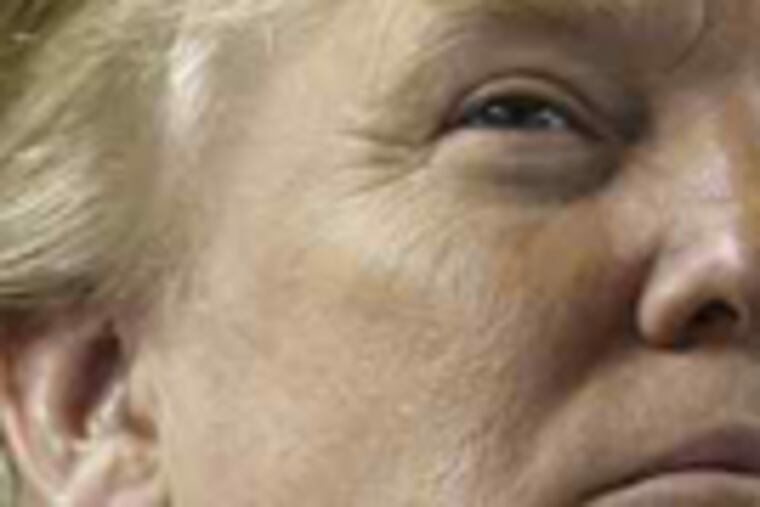Trump still going after Times writer
Donald Trump is taking another swing at a New York Times writer he contends deliberately underestimated his worth in a book.

Donald Trump is taking another swing at a New York Times writer he contends deliberately underestimated his worth in a book.
Lawyers yesterday filed notice with the New Jersey appellate court to fight a Camden County judge's decision last month that dismissed a libel suit Trump filed against Timothy O'Brien.
In his 2005 book, TrumpNation: The Art of Being the Donald, O'Brien quoted three anonymous sources who estimated the mogul's net worth to be in the millions. At the time the book was published, Trump said his net worth exceeded $5 billion.
The man who made "you're fired" his mantra on the NBC series The Apprentice said yesterday that he won't be dismissed.
In an interview from his New York office, Trump said he went to great lengths to document the size of his fortune for O'Brien.
"I just want honesty. I'm worth many billions of dollars," Trump said. "Here's a guy who thought he could make money reporting otherwise."
In the libel suit, lawyers contended that O'Brien "knowingly published inaccurate information to embarrass Trump, to damage him in his business and professional dealings, and to create publicity" for his book.
The lawsuit included statements from the book, newspaper articles and interviews in which O'Brien derided Trump as "the walking embodiment of financial pornography."
Superior Court Judge Michele M. Fox disagreed that the statements amounted to malice, which is needed to prove a libel lawsuit.
"While the comments made by O'Brien about Trump may suggest a lack of professionalism and/or personal animus against Trump," Fox said in her oral decision dismissing the suit, "they do not establish clear and convincing evidence of actual malice."
Jerome Shestack, a libel expert with Schnader Harrison Segal & Lewis in Philadelphia, said the outcome of an appeal would be hard to predict.
"If there's a factual dispute here, let the jury decide," Shestack said. He added that O'Brien's remarks might be enough to get the case before a jury.
"It's a pretty hard standard to find malice," Shestack said. "Malice may be built into O'Brien's character, but it may not rise to legal malice."
Yet Trump has "an interesting appeal point" and a jury could find in favor of him, Shestack said.
In her opinion, Fox noted that O'Brien quoted a variety of sources in the book, including some who estimated Trump's worth in the billions.
William Tambussi, one of Trump's attorneys, said the appeal would argue that the issue should be put before a jury, as a previous judge ruled. The lawsuit moved among four judges.
The appeal also may address the anonymous sources O'Brien used. O'Brien protected the identity of the sources when he turned over redacted notes and some taped interviews, as he was required to do by law. Other taped interviews had been destroyed.
Tambussi said O'Brien should not be allowed to cite anonymous sources to prove the validity of his book.
Last month, O'Brien, now a business editor at the Times, said he was gratified that the judge's ruling "vindicated" his reporting. He referred all other questions to his attorneys.
Marvin Smilon, a spokesman for the law firm defending O'Brien and his publisher, Hachette Book Group Inc., last month called the lawsuit meritless. Smilon said yesterday that he had no additional comment.
Tambussi said Fox's decision did not vindicate O'Brien's reporting, and vowed to take the case to the Supreme Court if necessary.
"Do I think Donald Trump is running a fool's errand? I do not," Tambussi said. "It's not unusual for libel suits to make three trips to the appellate court, and this one has some complicated issues to it."
Should he win the suit, Trump could become significantly richer. He is seeking more than $2.5 billion in damages.
Clarification: A story Aug. 14 on a libel suit filed by Donald Trump incorrectly implied that Timothy L. O'Brien, author of TrumpNation: The Art of Being the Donald, destroyed tapes of interviews gathered in the course of reporting for his book. An attorney for O'Brien, a journalist with the New York Times, said O'Brien did not destroy any recordings. The article also incorrectly said a judge involved earlier in the case ruled that a jury should hear the libel suit. No such ruling was made. The story should have noted that the New Jersey Appellate Division ruled that O'Brien did not have to reveal confidential sources because their use was protected by law in New York and New Jersey. O'Brien also should have been given an opportunity to respond to a legal commentator's opinion about his character.